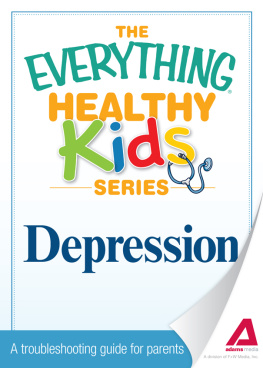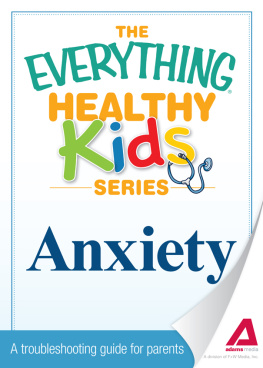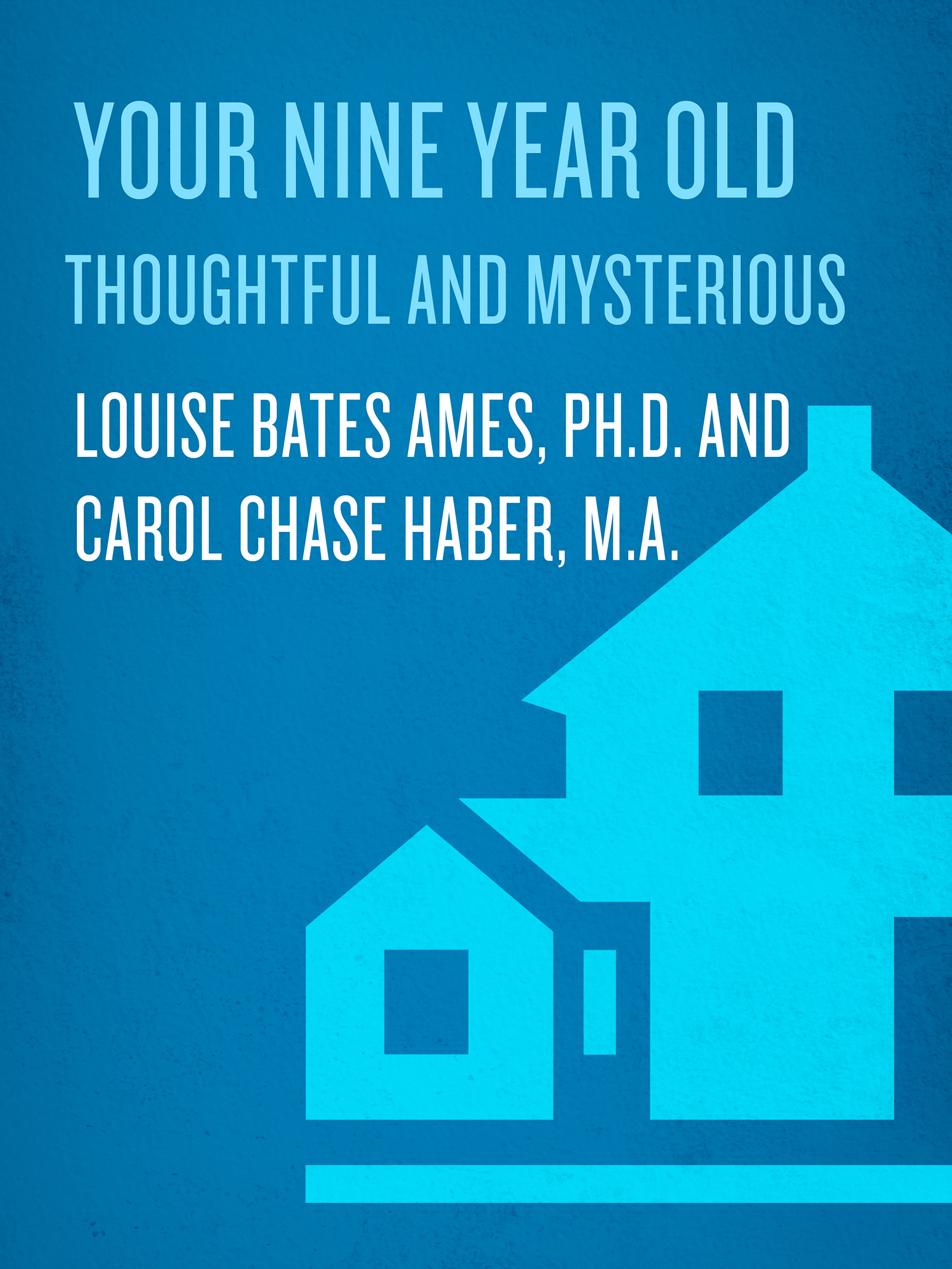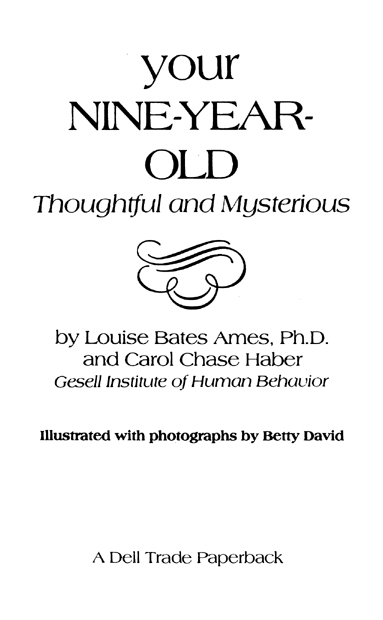CAN
YOUR NINE YEAR OLD
MAKE YOU A HAPPIER, LESS STRESSED, AND MORE EFFECTIVE PARENT?
YOU BET!
FIND OUT ABOUT
- What unsettling facts you need to know about your childs IQ scores. See .
- Your childs body type: round and plump or bony and angular does it predict behavior, food preferences, and more? See .
- Food allergies are they the hidden factor in your childs frequent illnesses or misbehavior? See .
- The problem of punishment sixteen dos and donts that can keep you from making some common, sometimes serious, mistakes. See .
- The truth about gender identities and how to help your child feel comfortable about his or her sexuality. See .
- Smart kids the activities you can initiate that can give your child a dramatic boost in thinking skills. See .
and more!
YOUR NINE YEAR-OLD
I think [these books] are delightful and likely to capture the imagination of young parents enough to get them through these years. I think the books will be both a pleasure and support for many parents.
T. Berry Brazelton, M.D., author of
Toddlers and Parents and Infants and Mothers
These are cheerful, optimistic books. I agree with just about everything they say.
Lendon Smith, M.D., author of
Feed Your Kids Right
A Dell Trade Paperback
Published by
Dell Publishing
a division of
Bantam Doubleday Dell Publishing Group, Inc.
1540 Broadway
New York, New York 10036
YOUR CHILDS GROWING MIND by Jane M. Healy: Copyright 1987 by Jane M. Healy. Reprinted by permission of Doubleday & Company, a division of the Bantam Doubleday Dell Publishing Group, Inc.
P.L.U.S. PARENTING: TAKE CHARGE OF YOUR FAMILY by Dr. Joseph Procaccini and Mark W. Kiefaber: Copyright 1985 by Dr. Joseph Procaccini and Mark W. Kiefaber. Reprinted by permission of Doubleday & Company, a division of the Bantam Doubleday Dell Publishing Group, Inc.
I HATE SCHOOL by Jim Grant: 1986. Published by Programs for Education, Rosemont, N.J. Reprinted by permission of the author.
Copyright 1990 by the Gesell Institute of Human Development
All rights reserved. No part of this book may be reproduced or transmitted in any form or by any means, electronic or mechanical, including photocopying, recording, or by any information storage and retrieval system, without the written permission of the Publisher, except where permitted by law. For information address Delacorte Press, New York, New York.
The trademark Dell is registered in the U. S. Patent and Trademark Office.
eISBN: 978-0-307-80898-1
v3.1_r1
CONTENTS
chapter one
CHARACTERISTICS OF THE AGE
Nine is an intriguing age but one that is a little hard to pin down. This may be because so much of the Nine-year-old childs behavior is uneven and unexpected. Thus in making designs the child of this age characteristically makes a very small design OR a very large one. Other behaviors are equally unpredictable. Whatever may be said of the child, the exact opposite might be true on another day. This can be confusing to the adult and, we presume, also to the child himself.
Perhaps the outstanding characteristic of the Nine-year-old is the fact that the child is emerging from his long, strong preoccupation with his mother (or other caretaking parent). Whereas at Eight he could not get enough of Mother, now he seems often almost to resent her presence and her demands. Eight depended on, or at least related strongly and warmly to, his mother (and for that matter to other adults). Nine is more independent, more self-motivated. He is a self-starter and once started wishes to continue in his own way, at his own time, in his own direction.
In fact, some Nines are so independent that they like to be loose on the town without being checked up on too closely. That is, they like to be allowed to play for a few hours without giving too specific information as to where they are going and what they are doing. Or to spend money that doesnt have to be accounted for. Nine may do best if allowed considerable independence and if given considerable responsibility.
Eight is one of the more characteristically expansive ages. The Eight-year-old is all over the place, speedy, sure. Nine is more anxious, more withdrawn, less certain, less speedy.
Though he does not cover as much ground, at least not as quickly, as he did a year earlier, he is still into everything. His interests are so varied and so numerous that his days are almost too full. Each afternoon is filled with some activitymusic lessons, sports, Cub Scouts or Brownies, choir practicealways something. He is driven by time but hates to give up anything.
Nine takes himself and his occupations very seriously, and wants to do things just right. A new sign of his maturity is that he can interrupt himself (or be interrupted), take a little side trip, and then return to his original occupation. He can keep his mind on what he is doing even when something interrupts. In fact, most Nines not only can finish a projectwhether it is a book or a quarrelbut need to finish it after they have been interrupted.
We have described Nine as an embroidery age. Thus some children, at least some of the time, need to elaborate on their productions and are not satisfied till they have put in every last flourish or curlicue. They do this not just to get praise, as may have been the case at Eight, but to satisfy their own inner demands. In fact, in this as in other ways, Nine is remarkably independent. It is as if the child at this age is using a more delicate mechanism than just earlier. In many situations a girl or boy makes more subtle and finer responses, notes smaller details. Emotions are more subtle. The child makes finer evaluations, notices tinier detailson a test, over radio or television, in a newspaper. During a recitation or even when reading he may make little, fiddling movements.
Not prey to as many self-doubts as he felt at Eight, Nine seems ready to tackle almost anything. This is an excellent age for perfecting proficiency in the basic academic subjects. The child is so much interested in perfecting his skills that he is not only willing but eager to do the same thing over and over, whether it is throwing darts or dividing by one digit. In fact, some Nines almost get dizzy from being so wound up in an activity. They make themselves see a thing through whether it is a five-mile hike, mowing a lawn, or making a transformer. Boys, especially, sometimes seem almost obsessed; they have a true sense of a goal and, when working against time, as in a speed test, their first query is Did I make it?
Completing a task is very important now, and Nine wants to know the scope and context of any new task before starting. Nines can do most anything they make up their minds to do; willpower is very strong. Children of this age can expend energy to make themselves do even hard and unpleasant things if they accept the task or idea and feel that they are doing it of their own accord.
Confronted with an unfamiliar task, the child of Nine may say Hm! and then look the situation over before beginning. Nines do not leap in recklessly as they might have done when just younger. They may actually verbalize Let me think about this. I always have to think first. That is, girls and boys both like to plan, want to know where they are going before taking the first step.






